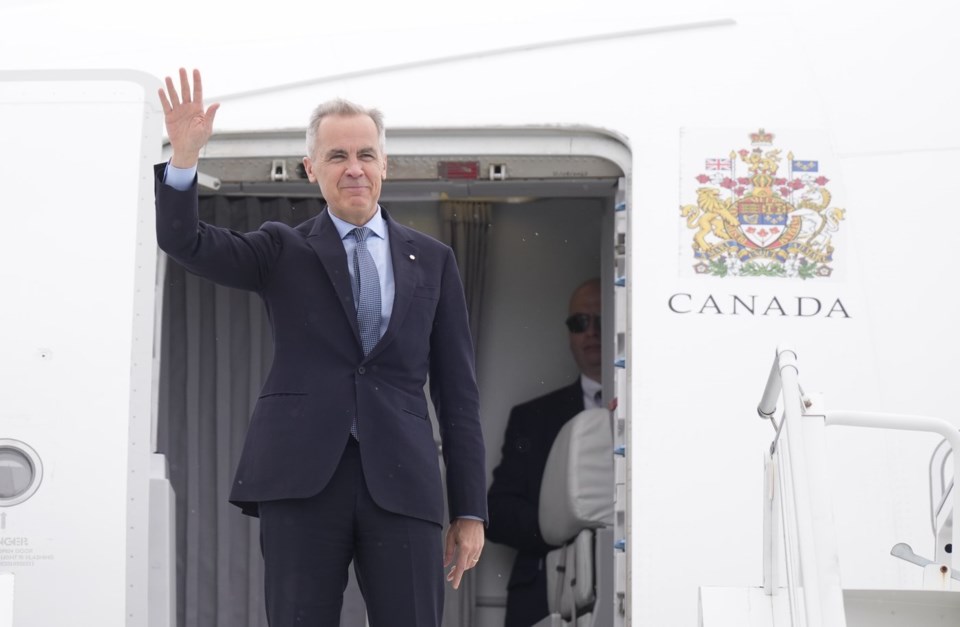WASHINGTON — Prime Minister Mark Carney arrived in Washington on Monday ahead of a meeting with Donald Trump which could serve to reset the bilateral relationship that's been upended by the president's tariffs and claims that Canada should become a U.S. state.
Carney, who is in D.C. with Trade Minister Dominic LeBlanc, Foreign Affairs Minister Mélanie Joly and Public Safety Minister David McGuinty, has said he expects "difficult, but constructive" conversations with Trump and his administration on Tuesday at the White House.
When asked on Monday what he expects out of the meeting with Carney, Trump said: "I'm not sure what he wants to see me about, but I guess he wants to make a deal."
On March 28, following the first phone call between Trump and Carney, the president posted on Truth Social that they agreed they "will be meeting immediately after Canada’s upcoming Election to work on elements of Politics, Business, and all other factors, that will end up being great for both the United States of America and Canada."
Throughout the election Carney said he was campaigning to be the person to take that meeting.
Carney will be tasked with a difficult balancing act — showing the strength expected by Canadians furious by Trump's taunts of annexation while also advocating for the removal of tariffs and further trade talks.
"It's really an opportunity for the two men to look each other in the eyes, discuss these issues and kick off the relationship in a constructive way," said Brian Clow, former deputy chief of staff to prime minister Justin Trudeau.
Clow worked in the Prime Minister's Office from 2017 until March of this year. He led the file on Canada-U.S. relations under Trudeau and had a front-row seat during the first Trump administration.
Trump likes to call his style of speech "the weave." Clow said the Trump seen in news conferences, that jumps from topic to topic, "is what we experienced in private meetings and on phone calls."
"So you do have to go into these meetings with a strong sense of what you are trying to accomplish and construct your argument as simply and clearly as possible," he said. "Because you just don't have a lot of time to build out your arguments. You've got to get clear, clean facts across in a way that the president will be receptive."
Clow said Carney has to maintain a "delicate balance" and "it partly depends on the mood of the president and his team."
The goal for Canadian officials should be to lay the groundwork for future talks between the White House and Canadian officials to have the tariffs removed, Clow said, though he doesn't expect an immediate drop in duties following the meeting.
Trump went ahead with economywide tariffs against Canada in March, only to partially walk back the duties a few days later on imports compliant with CUSMA rules. Canada was also hit by steel, aluminum and automobile tariffs.
The Canada-U.S.-Mexico Agreement on trade, called CUSMA, was negotiated during the first Trump administration. The continental trade pact is up for review next year but Trump has made it clear he doesn't intend to stick to that timeline.
Former U.S. ambassador to Canada Gordon Giffin said the most important thing will be for Carney to establish "his credibility and confidence." Giffin relayed the old saying that there's only one opportunity to make a first impression.
"I think the new Prime Minister Mark Carney has an opportunity to establish himself as a peer and an equal — as a sovereign leader of our next door neighbour — in his first meeting with President Trump," said Giffin, who served under former president Bill Clinton.
Trump has described Carney as a "very nice man" and members of his administration described the prime minister as a serious person. While there are indications that Trump is taking a different approach to Carney then he did with Trudeau, pressure on Carney remains high both at home and in the U.S.
Giffin described it as the Goldilocks Syndrome: some people don't want Carney to be too hot, some don't want him to be too cold. Everybody wants him to be just right.
Giffin said he would advise Carney's team to go into the meetings with three things they can put on the table. He suggested Carney show how Ottawa will meet its defence spending targets, further measures to boost border security and push back on any efforts by China to dump product in Canada.
Those have been included in a list of complaints Trump repeats about Canada but experts have said there are signs Trump still values CUSMA.
When Trump took his trade war to the world with "reciprocal" tariffs in early April, Canada and Mexico weren't included. He also made partial carveouts in his automobile tariffs for vehicles compliant under CUSMA.
Trump likes to say that other counties don't have the cards, but Giffin said "Canada actually does have cards."
"No matter what President Trump says, we do need Canadian energy, we need Canadian heavy oil."
This report by The Canadian Press was first published May 5, 2025.
Kelly Geraldine Malone, The Canadian Press




